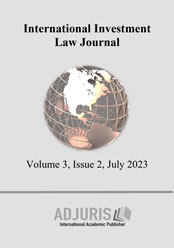The Law of the Digital Economy a Reality for Legal Relations in the Future - New International Investment Protection
The Law of the Digital Economy a Reality for Legal Relations in the Future - New International Investment Protection
Author(s): Manole Decebal BogdanSubject(s): Civil Law, ICT Information and Communications Technologies, Socio-Economic Research, Commercial Law
Published by: EDITURA ASE
Keywords: artificial intelligence law; the law of the digital economy; civil law;
Summary/Abstract: Trade through information and communication technology, production of goods, services made with the help of programs and computers are certainties and normality’s of social behavior. Services assisted by artificial intelligence no longer surprise users, individuals, and representatives of private and public law persons, becoming social and economic normality. We believe that legal relations in the digital economy must be reconsidered. The legal subjects are, in this case, software producers, traders, users of robots and/or bots, as well as beneficiaries of virtual services. The law of the digital economy is a reality in legal relations. Authorities must regulate these complex legal relationships based on legal rights and responsibilities. Digitization sometimes makes the economy work without knowing the physical location, the fiscal domicile of the operators, having only an address on the website that is or is not under national or interstate authorities. Also, parallel monetary flows are created that benefit only from the protection of "confidence in the system" and do not benefit from accredited public monetary authorities. In this whole process, the new regulations have an increased potential to bring specific protections to international investments. The research methods used are scientific documentation, observation of the phenomenon and the differences between the subjects and the object of law in the classical economy compared to the digital economy. The results of the study will constitute a basis for reflection for the authorities, for the business environment and researchers in the field of law. Starting from this study, proposals can be created to amend the current legislation. The implications of the study are a completion and revision of civil law, commercial law, criminal law and tax law with the elements determined by digital technologies that serve the acts and facts that generate liabilities. The persons who handle the digitized instructions can also be held responsible for the execution of acts and facts in the digital economy.
Journal: International Investment Law Journal
- Issue Year: 3/2023
- Issue No: 2
- Page Range: 146-155
- Page Count: 10
- Language: English

